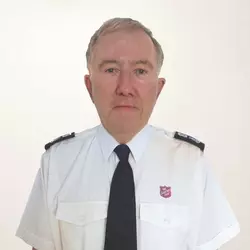16 November 2024
Matthew 22: Passion for learning
Major Melvyn Jones
Major Melvyn Jones invites us to be open to seeing and thinking differently.
Key text
At the start of our study passage, we are confronted with an array of scholars – Sadducees, Pharisees, an expert in the Law and a teacher. The latter is Jesus, who is referred to as ‘teacher’ – rabbi – more than by any other term in the Gospels.
Pause and reflect
- Read verses 15 to 33
The Pharisees ‘trap him in his words’ (v15), ‘evil intent’ (v18), ‘you are in error’ (v29) and ‘astonished at his teaching’ (v33) make it clear that this was no meeting of minds. The Sadducees and Pharisees were not interested in finding common ground or seeking the truth. They were using their knowledge and intelligence to attack Jesus. They failed.
I rather like the comment attributed to novelist Andrew Lang about the use – or misuse – of statistics: ‘People use statistics as a drunk uses a lamppost – for support rather than illumination.’ The same can often be said of intelligence. People can use their intelligence to support what they have already decided, rather than to shine light on new insights and see things differently.
Our gut reaction usually takes the lead. Our intelligence then follows, providing arguments to support that gut reaction, the intellect being used to justify our emotional decision.
The Sadducees and Pharisees had already made up their minds about Jesus. Their gut reaction was that he was dangerous. Their emotions – fear, jealousy, pride – were driving their actions. They were using their knowledge and intelligence to support their already-made-up, closed minds.
It’s impossible to teach someone who has a closed mind because they are not interested in learning. They have no passion for learning.
Pause and reflect
- Jesus said: ‘Come to me, all you who are weary and burdened, and I will give you rest. Take my yoke upon you and learn from me, for I am gentle and humble in heart, and you will find rest for your souls. For my yoke is easy and my burden is light’ (Matthew 11:28–30).
- What difference does putting Jesus’ words into practice make to our lives?
Luke 2:41–52 tell the story of Jesus as a 12-year-old boy sitting in the Temple courts among the teachers. Jesus listened and asked questions. The passage ends by stating that he grew in wisdom and stature. No closed mind here.
Teaching was an important part of Jesus’ ministry. In Matthew 9:35 we read: ‘Jesus went through all the towns and villages, teaching in their synagogues, proclaiming the good news of the Kingdom and healing every disease and illness.’
Jesus did not only want to teach; he wanted people to learn from him. Just because something has been taught does not mean it has been learnt.
Pause and reflect
- How do we identify people with a passion for learning?
Jesus attracted followers who wanted to learn from him. They sought instruction. One requested: ‘Lord, teach us to pray’ (Luke 11:1).
However, not all who initially followed him had open minds. Some were offended by his hard teaching and deserted him. Jesus asked his disciples: ‘You do not want to leave too, do you?’ (John 6:67). Simon Peter answered: ‘Lord, to whom shall we go? You have the words of eternal life’ (John 6:68).
Pause and reflect
- Are there any parts of Jesus’ teaching that you find hard?
- Are there any that challenge you to see some aspect of life in a new light?
Returning to our study passage, the expert in the Law tested Jesus, asking: ‘Teacher, which is the greatest commandment in the Law?’ Jesus replied: ‘Love the Lord your God with all your heart and with all your soul and with all your mind. This is the first and greatest commandment’ (vv36–38). Jesus was almost certainly thinking of Deuteronomy 6:5: ‘Love the Lord your God with all your heart and with all your soul and with all your strength.’
Pause and reflect
- The Old Testament verse is almost identical to what Jesus said, but there is a difference. Can you spot it?
Much time could be spent trying to explain this minor difference, but the meanings of both statements are the same – love the Lord God with your total being, with everything that you are. That includes your mind.
Some Christians are wary of knowledge and intellect. They might comment: ‘Christianity is about life in the Spirit, not the dry bones of theology.’ To support this view, they ironically quote that most intellectual and learned of New Testament writers, Paul: ‘Where is the wise person? Where is the teacher of the Law? Where is the philosopher of this age? Has not God made foolish the wisdom of the world?’ (1 Corinthians 1:20).
It’s understandable to be wary of the misuse of knowledge and intellect, as we have seen with the Sadducees and Pharisees. However, that should not stop the correct use of them.
Our minds are part of who we are and part of our commitment to God. There is nothing God-honouring in excluding our minds from our spiritual journey. Bones without life are, indeed, dry and useless. However, with life – life in the Spirit – bones provide a much-needed framework for our faith.
All Christians are called to be disciples – to be followers and learners. That’s very difficult if we close ourselves off from the one who has the words of eternal life. To be open to new experiences, deeper understandings and fresh insights is lifelong learning, lifelong discipleship. That is life in the Spirit!
Bible study by

Major Melvyn Jones
Retired Officer, West Wickham
Discover more

Richard McIntosh considers faith, teaching and the valuable role that Christians can play in the world of education.

Major Ian Mountford encourages us to identify those called and gifted by God to teach.

Lieut-Colonel Jayne Roberts considers how we can nurture believers.

Captain Callum McKenna challenges us to build a discipleship that will last all weathers.
